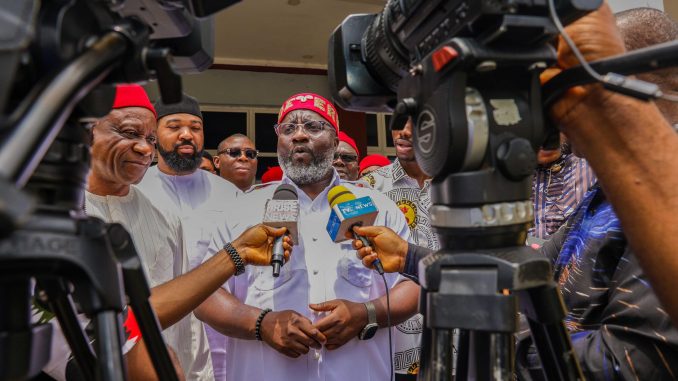
Owerri, August 7, 2025
In a moment that will be remembered long after the applause faded, Dr. Chima Matthew Amadi stood before a hall filled with Catholic men at Obiri Odenigbo, Maria Assumpta Cathedral, and did not deliver a lecture. He lit a fire.
At the 2025 Seminar of the Owerri Archdiocesan Council of Catholic Men Organisation (OACCMM), An academic with both global depth and local conscience, governance expert delivered a keynote titled “Where Are the Prophets?” What followed was not polite commentary. It was an unmasking. A confrontation. A call to spiritual and civic rebellion.
He began not with flattery, but with clarity.
“We are gathered in a Year of Jubilee. But how can we speak of restoration when children sit on broken floors, and our roads carry corpses on foot because ambulances cannot pass?”
That line landed like thunder. The hall shifted. Heads bowed. Pens froze. The silence that followed was not boredom. It was conviction settling in.
Amadi didn’t come to entertain. He came with a burden. From Nathan to Elijah, from Amos to John the Baptist, he drew a bloodline of prophets who defied kings and called societies to repentance. These were not clergymen hiding in temples. They were citizens who refused to be silent when power went rogue.
Then came the pivot.
“We ask where the prophets are. But maybe God is asking us the same thing. Where are you?”
At that moment, the seminar stopped being a seminar. It became a mirror. And every man in the room had to choose between being a disciple or a spectator. Between being Nathan or being Pilate.
If anyone thought Amadi came to inspire and leave, they misread him. He came armed with uncomfortable truths.
₦330 billion. That is how much Imo State’s local governments received from 2019 to 2025. Real money. Federal money. Meant for schools, clinics, roads, and rural progress.
“And yet,” Amadi asked, “where are the results?”
He spoke of public schools still operating in ruins, clinics locked or overrun by weeds, and rural communities still carrying their dead on foot because no road is motorable. He was not emotional. He was forensic.
“We did not lack money. We lacked men. Men who fear God more than they fear losing contracts. Men who know that silence in the face of evil is not neutrality. It is betrayal.”
His voice, though calm, cut like a scalpel. This was not outrage. It was surgery.
Amadi turned to the Arondizuogu massacre earlier this year. He recounted the horror. The bloodshed. The helplessness of communities left to bury their dead while elected officials vanished into excuses and blame games.
“We do not just have insecurity,” he said. “We have institutional abandonment. We have leaders who pray at night but refuse to protect their people by day. And the greatest threat is not the gunman. It is the educated man who knows the truth but stays silent.”
This was not political theatre. It was a reckoning.
Amadi did not simply speak from anger. He anchored every point in Scripture, Catholic social teaching, papal encyclicals, and canonical truth.
“We are not meant to be spectators. We are Christ’s ambassadors. Politics is not the devil’s playground. It is a mission field.”
He quoted Pope Francis, Gaudium et Spes, the Catechism, and Vatican II. But he did not quote them for prestige. He used them as fuel.
“Will you be like Nathan, who told the king the truth? Or like Pilate, who washed his hands and walked away?”
No one moved. No one dared to. Every man in that hall had to reckon with the question: Have I been silent when I should have spoken?
In his closing, Amadi turned the room into a furnace.
“Let it not be said that in our time, God found no one to speak up. Let it be said that the Catholic men of Imo stood in the gap. That we refused to be complicit. That we defended the widow. That we remembered the poor. That we carried the fire of Jubilee into the streets.”
The hall erupted. But it was not applause for performance. It was the kind of applause that rises from conviction. From men who had just remembered who they are.
Dr. Chima Amadi did not come to impress. He came to disturb the comfortable and awaken the sleeping. He stood in a Catholic hall, but he spoke to the conscience of a state.
“The prophets are not gone,” he declared. “They are rising. And they are not just in pulpits. They are in classrooms, in council chambers, in farmlands, in parish meetings. Anywhere truth is told and injustice is resisted, a prophet is alive.”
As the hall rose to its feet in thunderous ovation, one elder leaned over and said, “This was not a seminar. This was fire from the altar.”
And he was right.
This was not a keynote. It was a divine interruption.
This was not a mere man speaking. It was a man possessed by justice.
This was not an event. It was a warning, a wake-up, and a war cry.
Dr. Chima Matthew Amadi is standing in the gap.
And whether the system is ready or not, the prophet has entered the ring.
